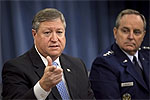Donley: Sequestration Hits Air Force Readiness, Modernization
 WASHINGTON, May 24, 2013 – Sequestration has hit the Air Force particularly hard, impacting its force structure, readiness and modernization, senior Air Force leaders said here today.
WASHINGTON, May 24, 2013 – Sequestration has hit the Air Force particularly hard, impacting its force structure, readiness and modernization, senior Air Force leaders said here today.
Air Force Secretary Michael B. Donley and Gen. Mark A. Welsh III, the chief of staff, said Congress must provide a solid budget number so the Air Force can ground its planning in reality.
The Air Force understands it must do its part to work through the debt and deficit reduction problem, Welsh said.
“We just want to get to the bottom line or the new top-line budget … and get on with preparing our Air Force to remain the best in the world,” he said.
Sequestration has hit the Air Force hard and the effects are felt throughout the full range of accounts from force structure to readiness to modernization, Donley said during his last scheduled news conference as secretary.
On April 26, Donley announced plans to step down June 21 as the Air Force's top civilian after serving as secretary for nearly five years.
“Twelve combat-coded squadrons have stopped flying, and important training has been canceled,” Donley said. “Weapon system sustainment reductions will delay maintenance, increase costs and create backlogs. The impending civilian furlough will hamper us further and will impact morale and reduce productivity across the Air Force.”
Even before sequestration there was a readiness crisis in the Air Force, the secretary said. “The readiness hole that we have been trying to dig out of just got deeper, and we are facing a readiness crisis from which it will take many months to recover,” he said.
And it is not just operations and readiness accounts that are at risk, said Donley, noting the Air Force needs modernization -- in aircraft, missiles, and capabilities.
“As advanced technologies proliferate around the globe, these cutbacks in modernization would put at risk the Air Force capabilities this nation will need in the decades ahead,” Donley said. “Despite our near-term and long-term concerns, we are working to ensure that our most significant Air Force priorities remain on track, including the fifth-generation F-35 Joint Strike Fighter, the KC-46 tanker, and the long-range strike bomber.”
Aircraft must support the warfighters, but budget cuts mean that airmen cannot train for full spectrum operations, Welsh said.
“And our readiness continues to decline, even while calls for potential no-fly zone or air policing operations in response to Syrian violence are reaching a new crescendo,” he said.
“We're still the best Air Force in the world,” Welsh said. “And our great airmen will rely on experience and their unmatched dedication to succeed in any operation that we're asked to execute. But atrophied skills elevate risk, and stagnant proficiency will only grow over time if we can't restore some sense of budget normalcy. And so that’s what we’re hoping for.”